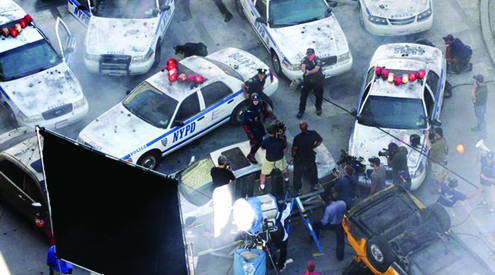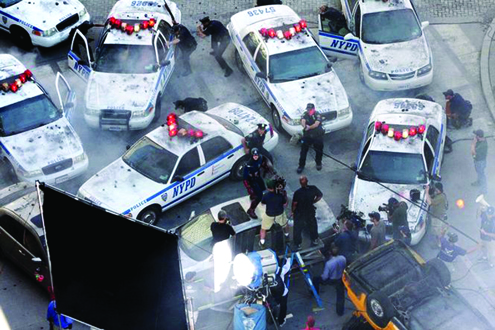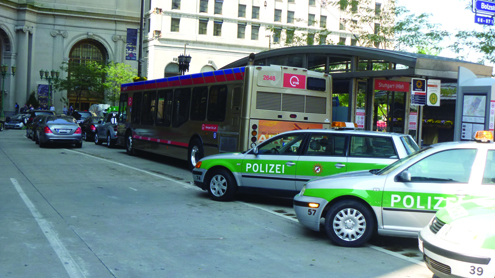

During filming of The Avengers, Greater Cleveland Regional Transit Authority made it possible to go with the flow
By Joseph Calabrese
Summer living is easy in a moderate-sized Midwest city. There may be more people out and about downtown than in the winter, but that’s about it.
Not so if Hollywood shows up, like what happened when Cleveland, OH became New York City and Stuttgart, Germany in Marvel Studio’s blockbuster movie The Avengers throughout August of last year. Marvel contacted the Greater Cleveland Regional Transit Authority (GCRTA) in late spring 2011 after working with the city on possible street closures for the film’s action-packed battles.
The studio informed our communications staff of the exact closures and when filming would take place. During that time overturned cars and major explosions with black smoke pouring through the streets were a common sight. Celebrity sightings created additional buzz as thousands flooded in to catch the excitement of Hollywood.
At the same time, all this required our transit agency to make major behind-the-scenes changes to accommodate film shoots at odd hours, while continuing to operate regular weekly service.
In the case of the GCRTA, we have had to adjust dozens of bus routes during the day and night and at the last minute to allow film companies to take advantage of Ohio’s advantageous film tax credits. The challenges routinely include rerouting instructions to the operators and effectively getting the word out to customers.
Here are a few lessons GCRTA learned while accommodating the filming of a half dozen motion pictures this summer, the largest by far being The Avengers.
Plan Ahead
Plan as much in advance as possible. This includes selecting team members and affected parties internally, as well as identifying external stakeholders. Operations teams in service quality, the bus garages and service scheduling and management worked internally with filmmakers and with the City of Cleveland to discuss street closures, additional security and other possible concerns at every step.
Communications and marketing staffs worked closely with these departments within GCRTA, as well as with external entities like the media, who needed to be a great partner in order for customers to receive reroutes and changes.
Laying out needs in advance for extensive movie schedules can help everyone ask the right questions. The same goes for laying out a strategic plan for dissemination of information.

Pick strong teams
Evaluate the effects on each area of the agency and assign a team member from each affected department as the point person. Select individuals in the organization who are key players in each department who can be available 24/7 in the event of changes or emergencies.
GCRTA had individuals on committees representing service quality, transit police, communications, marketing, the customer call center, the sign shop and bus operations.
Schedule regular briefings to keep the team updated as major changes develop. Assign someone to document changes, concerns and updates from each meeting.
Use all communications tools
Use all available communications methods and channels. GCRTA used Facebook, Twitter, Commuter Alerts, media alerts, website updates, phone calls to media and customer service representatives to tell customers about the changes. GCRTA created a special Avengers Commuter Alert where 700 customers signed up to receive closure alerts via text or email. The sign shop and graphic designers were kept busy with a number of signs to tell customers where to catch a bus if filming blocked off streets and intersections. Additional transit police officers assisted the when drivers and pedestrians needed to be directed to an unusual spot.
Be consistent
If the agency tells customers to expect a route to change and film crews make subsequent changes, stick with the message customers originally received for that day. If filming ends at 2 p.m. but the reroute goes through rush hour, do not change it. Make sure customers know the agency will do what it says. Just alert everyone inside and outside the organization to any changes as soon as possible.
Expect the unexpected
Outdoor filming depends on weather conditions, so the scheduled wrap date may not be the final filming date. Along those same lines, film crews may ask to add extra days at the last minute, which will disrupt bus schedules, cause street closures and inconvenience customers. Anticipating that such changes will occur makes it much easier to roll with them. Always keep customers in mind.
With each of the movies filmed here in Cleveland, there were always additional last-minute changes and lengthier filming schedules than initially expected. GCRTA employees found that as much as we planned ahead, we needed to understand that Hollywood runs on its own schedule.
Unexpected changes will happen and you need to be flexible with those changes. Consistently communicate with employees, the media and directly with customers.
Ultimately customers know that a transit agency is helping boost a city’s bottom line, even though they might be inconvenienced along the way.
During filming, GCRTA carried thousands of people to and from work every day and kept up normal business for all customers. Even with Hollywood and tourists taking over, we accomplished our mission of safe transport. BR
Joseph Calabrese is the general manager and CEO of the Greater Cleveland Regional Transit Authority. He joined the agency in 2000.
